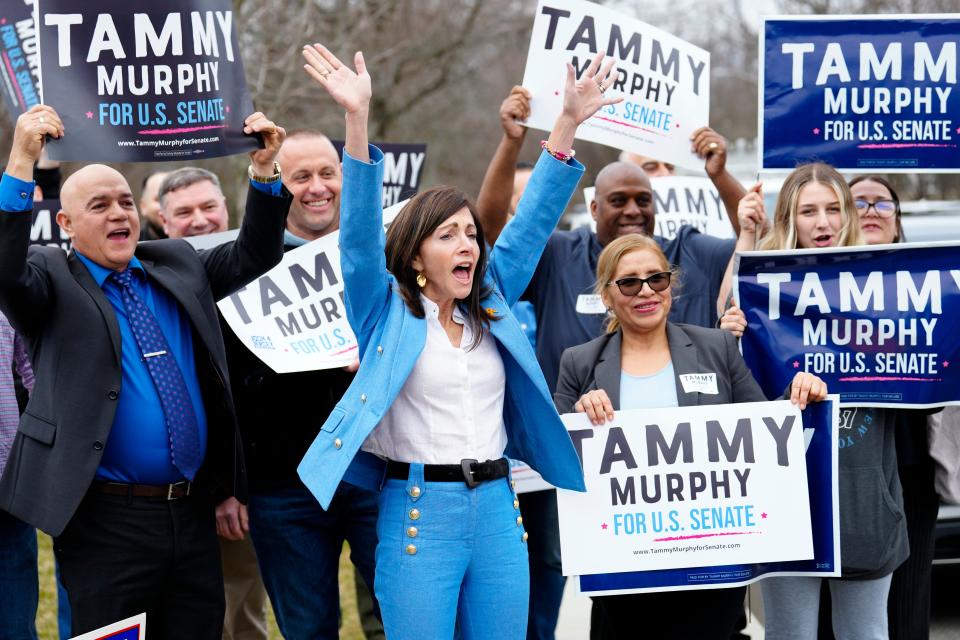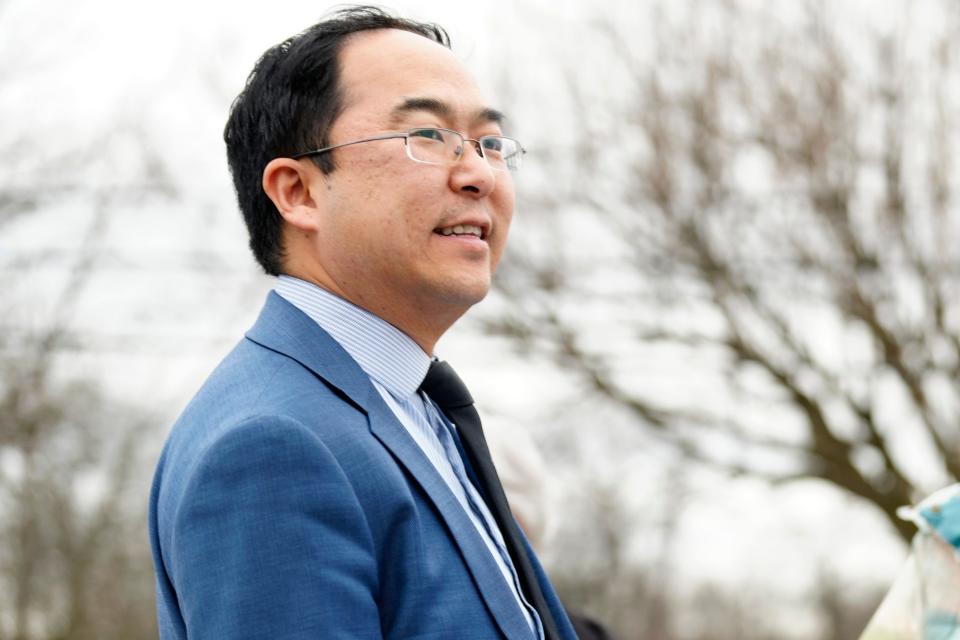What's the ethos of the NJ Democratic Party? Power at all costs | Stile
- Oops!Something went wrong.Please try again later.
- Oops!Something went wrong.Please try again later.
- Oops!Something went wrong.Please try again later.
As reformers clamor for change and fret over the future of democracy, the New Jersey Democratic Party doubled down with an anti-democratic exercise of power.
The party officials and defenders of the status quo are not shy or apologetic about it. In Bergen County last week, the Democratic Party herded delegates into the county convention with Hudson County-style efficiency to deliver first lady Tammy Murphy a crucial endorsement for her bid to win the party’s nod for the U.S. Senate in June.
Here was a county organization built on patronage, rounding up extra “bonus” delegates and last-minute replacement voters to ensure that Murphy went back home to Middletown with a key prize in her pocket: a coveted position on the June 4 ballot that brackets her in a column with other county-blessed candidates.

That proved an enormous advantage for Murphy, who triumphed over her chief rival, Rep. Andy Kim, D-Burlington, in a county with the second-largest cache of Democratic voters.
The only thing missing at the convention was the smell of stale cigar smoke and brass spittoons.
A fresh assault on OPRA
Two days later, in Trenton, Democratic leaders fast-tracked a sweeping “overhaul” of the Open Public Records Act, a law that gives the public and press access to some internal documents from government agencies.
But in truth, the expansive legislation is more of a clampdown on access, an attempt to put new hurdles on obtaining records that give the public and journalists an unvarnished look at how their government operates or is abused.
In a state notorious for corruption, the original OPRA law was supposed to offer a shaft of much-needed sunlight into public entities.
Now the Democratic lawmakers are drawing the blinds.
“This bill would move New Jersey back into the dark ages when it comes to government accountability,” former state Sen. Loretta Weinberg, D-Teaneck, a champion of transparency, wrote on X, formerly known as Twitter.
“Call your senator. I’m embarrassed that a Bergen County senator is the prime sponsor,” she wrote, referring to state Sen. Paul Sarlo, D-Wood-Ridge.
Thisl bill would move New Jersey back into the dark ages when it comes to government accountability. Call your senator. I’m embarrassed that a Bergen county senator is the prime sponsor. https://t.co/axkZu64V7I
— Loretta Weinberg (@SenatorLorettaW) March 6, 2024
The new tightening-of-screws legislation would, among a slew of things, exempt email and call logs while making it generally more difficult to request emails; extend the time for agencies for comply with requests; and give officials power to reject or redact requests if they believe it could lead to “harassment" — a vague and subjective standard that creates another unneeded hurdle. There are many others.
“It would hide more public information behind lock and key, while creating new obstacles for requesting documents that should still be available,” Nicole Rodriguez, president of New Jersey Policy Perspective, a good-government advocacy group, said in a statement.
“When documents are created by public officials on public salaries with the public’s trust, there’s no good reason to restrict public access to that information, yet that’s exactly what this bill does," she said.
The law is a sequel of sorts to last year’s power grab, the Election Transparency Act, a bill that dramatically expanded the amount of cash allowed to flow into New Jersey campaigns. The new OPRA bill is already on the move, with an Assembly hearing set for Monday.
More Charlie Stile: What's Tammy Murphy's flex? Bergen County's Democratic machine delivered a win
We can't forget the ethos of NJ political power
The dual anti-democracy actions — one in the closed confines of the Statehouse, the other inside the party clubhouse — illustrate the New Jersey ethos of political power.
Power in New Jersey is not primarily an instrument to be used to bring change. It’s an instrument to deliver the spoils and grease the transaction and to protect incumbents fortunate to rise to the top of the political food chain.
It’s how it has always been done. Why? Because the status quo works and it bears the fruit of patronage and majority party control, from the town council to the governor's office. Preserving the status quo begins with the bracketing of candidates on the county “line” column, which in almost all instances ensures easy victory in the primary.
Somerset County Democratic Chairwoman Peg Schaffer gave an unvarnished defense of the system in a letter to committee members earlier this month.
“Due to the success of the organization we have worked with the [Murphy] administration and local officials to put many of our members on the Superior Court," Schaffer wrote to county committee members, urging them to vote to give Tammy Murphy the line last week. “We have gotten our local members responsible, rewarding positions with State and County government."
"The Organization is what turned Somerset Blue. We did this together. WE ARE THE ORGANIZATION!" Schaffer added.
The truth is that “the line,” and the process of awarding it, is a Tammany Hall-style relic that gives party bosses immense sway over which candidates can compete and which are doomed to lose.
In addition to Bergen, influential party leaders in Essex, Union, Passaic, Hudson and Middlesex — home to nearly 60% of the Democratic Party’s registered voters — have pledged their support to Murphy, who has never held elected office.
The support is likely to give her the coveted spot on the ballot. That makes her the odds-on favorite to beat the more experienced Kim, a three-term congressman who flipped a Republican district and who served as an adviser to top generals in Iraq and Afghanistan.
Those party bosses made their choices shortly after Murphy entered the race. No one was entirely surprised — several county chairpersons are lobbyists with business interests before her husband, Gov. Phil Murphy. Why jeopardize the bottom line by allowing Kim to compete for the preferred ballot spot? There is no upside. It’s not good for business.
Kim, meanwhile, filed a federal lawsuit, hoping to abolish the line system and replace it with a format that groups candidates for the same office in separate blocks. It’s a method used around the country. Kim argues that it offers more of a level playing field, not one where the bosses have put their thumb on the scale for the governor’s wife.

In court papers, Kim’s suit triggered a sharp rebuttal that painted him as a late-in-the-game hypocrite who benefited from the same system earlier in his career and noted how he is also vigorously competing for lines around the state.
As it stands, he has won endorsements in five counties, including Monmouth, where the Murphys have lived for 25 years. As veteran Passaic County election lawyer John Carbone noted in court papers on behalf of seven county clerks named as defendants in the lawsuit, Kim "seeks not to tinker and tweak the process but tear and tumble down the process he participated in and sought the benefits for his candidacy.”
Maybe Kim is a late comer to the game, and perhaps it serves his campaigning strategy to put the process on trial before the March 25 filing deadline for candidate petitions. A court hearing is scheduled for March 18. Federal District Judge Zahid Quraishi may determine that it's too late in the primary fight to upend the system.
But given that the legislators who owe their careers to the county line system are unlikely to change it — they are too busy these days dimming the light of transparency by gutting the OPRA law — a court ruling may be the only way to “tear and tumble down” the anti-democratic relic.
Charlie Stile is a veteran New Jersey political columnist. For unlimited access to his unique insights into New Jersey’s political power structure and his powerful watchdog work, please subscribe or activate your digital account today.
Email: stile@northjersey.com
This article originally appeared on NorthJersey.com: NJ Democrats work at all costs to preserve power

